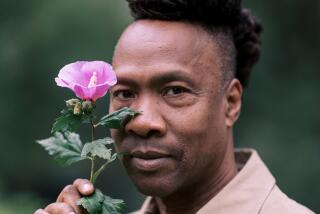Award-winning poet C.K. Williams dies at 78
- Share via
When C.K. Williams died Sunday at age 78, he was still a working poet. His next collection, “Selected Later Poems,” will be published by Farrar, Straus and Giroux on Tuesday.
Williams was widely respected; in 2005, he was awarded the coveted $100,000 Ruth Lilly Poetry Prize. He won the National Book Award in poetry in 2003 for “The Singing,” the Pulitzer Prize in poetry for “Repair” in 2000, and the National Book Critics Circle award in poetry in 1987 for “Flesh and Blood.” He was also a recipient of a Guggenheim Fellowship and a National Endowment for the Arts grant.
Williams was born into a working-class family in Newark, N.J., in 1936; he grew to 6-foot-5 and found his high school passions were “girls and basketball.” He tried playing basketball at Bucknell for a year before transferring to the University of Pennsylvania. He began publishing poetry in the early 1960s, married and then divorced, and began teaching in the 1970s.
“Poetry didn’t find me, in the cradle or anywhere near it,” he once explained. “I seemed to have started writing poetry before I’d read any.”
Williams was known for his long lines that were both moving and accessible. “There’s nobody like him in the language,” Jonathan Galassi, Williams’ editor and now head of Farrar, Straus and Giroux told the Newark Star-Ledger in 2000. “He writes a very long line that is his own creation. He tries to incorporate as much of what we’re really thinking when we say or do something. He has a strong analytic mind that can dissect powerful emotions that he unfolds in layers. All in all, his poetry is unique.”
He served as a chancellor of the American Academy of Poets and for many years taught at Princeton University. He and his second wife had split their time between Princeton and her home country, France.
He was also the author of a memoir, “Misgivings,” a book about Walt Whitman, translations of “The Bacchae” and Sophocles, and the essay collections “Poetry and Consciousness” and “In Time.”
“There is despair contemplating humanity, if you’re looking at all the violence and unnecessary death. Then, you see that human being after human being is living life. And there is joy in it, because in existence there is also great joy. If you spend your whole life being depressed about life, you’re wasting it,” he told the Los Angeles Times in 2010. “That’s the wisdom of my old age.”
Twitter: @paperhaus
More to Read
Sign up for our Book Club newsletter
Get the latest news, events and more from the Los Angeles Times Book Club, and help us get L.A. reading and talking.
You may occasionally receive promotional content from the Los Angeles Times.











